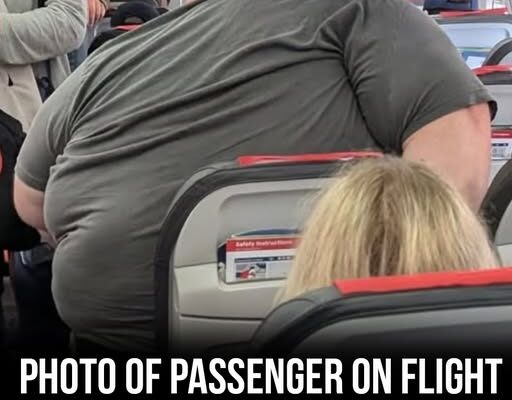A viral photo showing a plus-sized passenger struggling to fit into an airline seat has reignited a heated and emotional debate about fairness, accessibility, and personal responsibility in air travel. The image, originally posted by consumer advocate Christopher Elliott and later reshared by the hip-hop group Pretty Ricky, quickly spread across social media platforms. Within hours, it drew thousands of comments and divided opinions. Some users expressed frustration, arguing that passengers who cannot comfortably fit into one seat should be required to purchase two. Others countered that the real problem lies with airlines that have continually reduced seat sizes to maximize profits.
In recent years, airplane seats have become noticeably smaller, while the average body size of travelers has increased. Studies show that seat width has decreased from about eighteen inches to as little as sixteen inches on some aircraft. This compression has made flying more uncomfortable for nearly everyone, regardless of body type. Critics of airline policies argue that shrinking seats are a symptom of a broader issue in the industry, one that prioritizes revenue over passenger comfort and dignity. For plus-sized travelers, this can turn an already stressful experience into one filled with embarrassment and frustration.
Some people have suggested that airlines introduce a wider range of seat options. For example, a few propose offering larger, more spacious seats at higher prices, similar to how extra legroom or premium economy options are sold. This would allow passengers to choose what best fits their needs without being shamed or singled out. Others insist that such policies could unfairly penalize larger passengers, effectively charging them more for their bodies. This argument often intersects with broader discussions about body acceptance and discrimination, sparking passionate responses from both sides.
Plus-size travel influencer Jaelynn Chaney has become one of the most visible voices in this ongoing conversation. She argues that the issue is not about individual choices but about systems that fail to accommodate human diversity. In her words, “The issue isn’t me, it’s the system.” Chaney believes that airlines should provide free extra seating for plus-sized passengers and that government regulations should ensure accessible travel for all body types. Her advocacy has gained significant attention, as she frames the debate not as one of personal responsibility but of equal rights and fair treatment.
Opponents of Chaney’s position see things differently. Many argue that the cost and logistics of offering free extra seats would ultimately be passed on to all travelers through higher ticket prices. They believe individuals should be responsible for purchasing the space they need, just as taller passengers often pay for extra legroom or travelers with special luggage pay additional fees. For them, the issue is less about discrimination and more about practicality and fairness in shared spaces.
This clash of perspectives reflects larger cultural tensions about body image, equality, and economic justice. It forces both travelers and airlines to confront uncomfortable questions about what it means to provide inclusive service in a profit-driven industry. Should airlines redesign cabins to accommodate a broader range of body types, even if that means fewer seats and higher prices for everyone? Or should passengers bear the responsibility for ensuring they fit within the current standards?
There are no easy answers. What is clear, however, is that the conversation about airline seating has become a microcosm of a wider social debate. At its core lies a fundamental question of empathy, economics, and human dignity. Whether the solution comes through policy changes, redesigned aircraft interiors, or shifting cultural attitudes, the discussion has made one thing certain. Air travel, once seen as a shared experience, now highlights just how differently people experience the same space.



